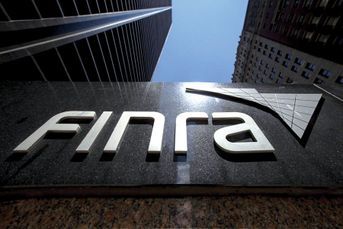Nontraded REIT sales fall off a cliff as industry struggles to adapt
Adapting to regulatory changes has been a struggle, meaning the nontraded REIT industry's worst fears have come true.
Sales of nontraded real estate investment trusts, the high-commission alternative investments sold primarily by independent broker-dealers, have fallen off a cliff.
Heading into 2016 facing a number of hurdles, namely a flurry of legal and regulatory changes that would quickly impact how brokers sell them, the nontraded REIT industry’s worst fears have come true.
Over the first five months of the year, sales of full-commission REITs, which typically carry a 7% payout to the adviser and 3% commission to the broker-dealer the adviser works for, have dropped a staggering 70.5% when compared with the same period a year earlier, according to Robert A. Stanger & Co. Inc., an investment bank that focuses on nontraded REITs.
Their recent sharp drop in sales is part of a longer cycle. The amount of equity raised, or total sales of nontraded REITs, has been sinking by about $5 billion a year since 2013, when sales hit a high watermark of nearly $20 billion.
Times have changed dramatically. Stanger estimates total nontraded REIT sales in 2016 will reach between $5 billion and $6 billion, or roughly 25% of their level in 2013. That year, former nontraded REIT czar Nicholas Schorsch and his firm, American Realty Capital, were at their zenith, and broker-dealers fattened their bottom lines from REIT commission dollars.
(Related: How Nicholas Schorsch lost his mojo)
All that has changed as sales of nontraded REITs at independent broker-dealers have dried up. Industry bellwether LPL Financial said in its first-quarter earnings release that commission revenue from alternative investments, the lion’s share of which comes from nontraded REITs, was just $7.8 million, a staggering decline of 86.7% when compared with the first quarter of 2015.
Other broker-dealers are reporting similar results. Sales of nontraded REITs at Geneos Wealth Management are down 60% to 65% year to date, according to Dean Rager, the firm’s senior vice president.
At the end of last year, industry executives told InvestmentNews that sales might be dampened by a new rule by the Financial Industry Regulatory Authority Inc., known as 15-02, that will make prices more transparent to investors. Executives also pointed to the coming fiduciary standard for brokers working with client retirement accounts — formally introduced in April by the Department of Labor — as a key factor in potentially depressing sales.
(Related: In-depth coverage of every aspect of the DOL fiduciary rule)
As a result of 15-02, broker-dealers have to more accurately reflect in customer account statements the amounts taken upfront in commissions and fees. There also will be downward pressure on fees if nontraded REITs are going to be sold into retirement accounts.
CLIENT’S BEST INTEREST
The DOL fiduciary rule, which will be phased in starting in April, requires advisers to select investments for retirement accounts that are in the client’s best interest. Investments with high commission structures might not pass that test.
Product sponsors are scratching their heads in an attempt to figure out how to sell REITs without the onerous, 7% upfront load — while wondering if a large number of brokers will stop selling the product if they don’t get the juicy commissions.
“I anticipate fees to come down. We’ve slowly seen that,” said Tony Chereso, CEO of the Investment Program Association, a trade group that represents nontraded REIT sponsors. “There is pressure on fees, from the sponsor fees to upfront commissions, as well as operating costs. And we will continue to see the market pressure other sponsors.”
The REIT industry is also continuing to face a hangover from the unraveling of Mr. Schorsch’s REIT empire and fresh new fears of investor complaints against a firm called United Development Funding. The offices of one of its REITs, UDF IV, were raided by the FBI in February. That was more than two months after the hedge fund manager Kyle Bass said it was operating like a Ponzi scheme. UDF has denied those allegations.
‘FOUR-HEADED HYDRA’
“Look at 15-02, the DOL, UDF and Schorsch,” Mr. Rager said. “That’s a four-headed hydra that’s attacked the industry and sent sales over the edge.”
To make matters more difficult for REIT sponsors, the Pacific Investment Management Co. issued a report in June highlighting the potential for a decline in the U.S. commercial real estate market, lowering overall prices by as much as 5% over the next 12 months.
“After the financial crisis, which sent prices sharply lower, commercial real estate in the U.S. has enjoyed growth with solid fundamentals,” according to the Pimco report. “But capital flows have grown unstable over the past year due to fears over interest rate hikes and, more recently, events such as political and economic uncertainty in China. While this instability began in the public commercial real estate markets, it has blown into private commercial real estate as well, particularly in non-major markets.”
“Sales are off, but a lot of that boils down to the industry … figuring out new pricing structures to comply with the DOL.”–John Rooney, managing principal, Commonwealth Financial Network
Hold on, some executives say. The fundamentals for real estate are sound, and the industry is trying to reinvent itself by creating nontraded REITs that have different fee structures and that are more favorable to investors.
“Sales are off, but a lot of that boils down to the industry … figuring out new pricing structures to comply with the DOL,” said John Rooney, managing principal of independent broker-dealer Commonwealth Financial Network.
“Brokers have pulled back from writing business in that product because of the uncertainty,” he said. “Sales will start to ratchet back up by the end of the year as we all figure out what the ground rules are.”
“I’ve been through a number of real estate cycles, and I’m thinking through what’s happening now into 2017, and I have an [optimistic] view,” said Glenn Rufrano, CEO of Vereit Inc., a traded net lease REIT formerly known as American Realty Capital Properties when it was the flagship of Mr. Schorsch’s empire.
Mr. Rufrano pointed to two positive factors for real estate investors: The slow but steady increase in gross domestic product and continued record low interest rates.
“GDP is important. As long as tenants pay rent and occupancy rates stay reasonable, we will be fine,” Mr. Rufrano said. “Two percent GDP is not a terrible number. It’s enough to keep the economy rolling and to have tenants pay rent.
PRESSURE ON RATES
“And with the cost of capital, which is very much related to the interest rate environment, it is very difficult to see long-term interest rates going up a whole lot between now and 2017,” he said. “In a world with no growth and the United States at 2% [growth], there will be continued pressure to keep rates down. I’ll take those two simple facts.”
Executive like Mr. Rufrano are natural optimists. Faced with the new Finra pricing rules and the DOL’s fiduciary regulation, the industry expected this type of decline in sales. And nontraded REIT sponsors and managers got a clear victory in April when the Department of Labor eliminated a list of asset classes that could be included in retirement accounts, because nontraded REITs had not been on it. Their worst fears had been allayed.
And there appears to be other bright spots. While sales of the REITs that pay the full 7% commission have dropped off the cliff, sales of other share classes, such as T shares, or those with a daily net asset value, have picked up.
T shares cut the upfront load by more than half and instead pay a 7% commission to the broker over time. The annual commission of 80 basis points is paid from the return generated by the REIT manager.
Along with so-called interval funds, which buy and hold nontraded REITs and other alternative investments but allow investors to cash out at the end of the quarter, sales of the REITs with different share classes, or NAV, in May accounted for 72.6% of total nontraded REIT sales, according to Robert A. Stanger. In January 2015, sales of those products accounted for just 3.7% of the industry’s total.
SEA CHANGE
“The due diligence process is just tougher,” said Neil Menard, president of CNL Securities Corp. “Broker-dealers are not only looking at the investment but its structure. In a very short amount of time, there’s been a sea change in the industry. Whoever talked about a T or I share in nontraded REITs? It was always an A share.”
Large institutions such as the Blackstone Group and Cantor Fitzgerald & Co. continue to show interest in the nontraded REIT space. That’s potentially good news for advisers and their clients as it signals elite firms want to compete in the nontraded REIT industry, long regarded as second class to listed REITs.
“We have anticipated over the past four or five years institutional managers entering this sector, and we welcome that movement into the industry,” said Mitchell Sabshon, CEO of Inland Real Estate Investment Corp. “It gives credibility to the nonlisted REITs as a potentially appropriate investment for individual investors.”
PRODUCT CHANGES
The changes occurring in nontraded REITs are similar to those that shaped the mutual fund industry in the 1980s, when commission structures on funds altered dramatically, he said.
(Bruce Kelly On Advice: REIT with a twist — and a high commission — is the new darling of IBDs)
“No investment product ever emerged at birth fully formed,” Mr. Sabshon said. “Products change over time due to economic cycles, investment preferences and regulatory changes, as well as the creativity of people who develop them.”
“The cost of distribution will need to continue to come down,” said Allan Swaringen, CEO of Jones Lang LaSalle Income Property Trust.
“Nontraded REITS have lived almost exclusively across independent broker-dealer channels,” he said. “I don’t think that’s a model that will be successful going forward. It has to be sold by a variety of advisers.”
Learn more about reprints and licensing for this article.








